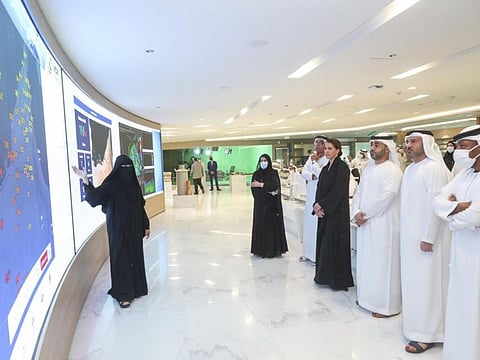UAE launches enhanced version of National Air Quality Platform
Real-time overview of air quality status and related health advice now at finger tips

Abu Dhabi: Mariam bint Mohammed Almheiri, Minister of Climate Change and Environment, toured the National Center of Meteorology (NCM) in Abu Dhabi, accompanied by Dr Abdulla Al Mandous, the director-general of NCM and president of the Regional Association II (Asia) of the World Meteorological Organisation (WMO) and several senior employees of the centre.
Joining them on the tour were Asilah Abdullah Al Mualla, director-general of the Fujairah Environment Authority, and representatives of the Environment Agency — Abu Dhabi (EAD), Dubai Municipality and Ajman Municipality and Planning Department.
During the visit, the minister inaugurated an upgraded version of the National Air Quality Platform, originally launched in September 2020. Accessible to the public, the revamped site provides a real-time overview of the current status of air quality in the UAE, monitored by a network of state-of-the-art stations spanning various residential, industrial, and rural areas as well as areas close to main roads. In addition to serving the community, the information available on the platform can benefit multiple sectors, including health and education. It also offers advice, particularly to sensitive groups, on mitigating the impact of air quality on human health.
‘Improving air quality’
Mariam bint Mohammed Almheiri said: “Public health and environmental protection are strategic priorities for the UAE. Improving air quality is among the eight pillars of the UAE General Environmental Policy, which was approved by the Cabinet in November 2020 with the aim of enhancing quality of life, well-being, and prosperity in the country, and support the implementation of the UN Sustainable Development Goals (SDGs).”
She added: “The National Air Quality Platform is an accurate scientific reference that allows us to track the progress made by our national projects and initiatives aimed at increasing the AQI score to 100 percent by 2040. The launch of the upgraded platform in partnership with NCM seeks to educate the concerned entities and the community on a very important issue that is closely linked to public health.”
Dr Al Mandous said: “This joint strategic project between NCM and the Ministry of Climate Change and Environment reflects the great commitment to the UAE public health, as it enhances awareness of air quality and its impacts on health. The second version of the platform contributes to reformulating many practices and developing innovative tools and projects aimed at enhancing air quality, which will have a positive impact on the environment and protect it from harmful airborne pollutants.”
‘Working alongside our various partners’
He added: “At NCM, we are committed to supporting all national efforts aimed at preserving the environment as a primary priority for our wise leadership. Also, we will continue to work alongside our various partners to develop initiatives that serve the objectives of the UAE General Environmental Policy and thus contribute to the promotion of quality of life in the UAE. NCM will also ensure ease of accessibility for all community members to the air quality database across the UAE.”
The National Air Quality Platform, available on NCM’s official website at https://airquality.ncm.ae/, features the Air Quality Index (AQI), a simplified colour-coded representation of data collected from each air quality monitoring station. The AQI is based on measuring the levels of five major pollutants — carbon monoxide (CO), nitrogen dioxide (NO2), sulfur dioxide (SO2), ground-level ozone (O3) and particulate matter with a diameter of 10 microns or less (PM10). The index uses a scale of 0 to 500, with 500 representing the highest level of air pollution. The lower the number, the cleaner the air.
Simplified data
The upgrade of the platform followed a series of consultation sessions with end users, a review of international best practices in this space, and benchmarking against similar sites. Based on the results, the data was simplified and displayed in a more user-friendly manner to make it easier to comprehend for the public. In addition, the site now features recommendations for outdoor activities based on air quality on any given day.
Air quality indicators
Users can check air quality according to area and learn about the health risks associated with each air pollution level, categorised by colours. Green indicates that air quality is suitable for exercise and other outdoor activities for all individuals. Yellow indicates that air quality is acceptable to most individuals, however, prolonged exposure may be uncomfortable for people with respiratory diseases or those performing strenuous outdoor activities, such as sports or physical labour. Orange indicates that members of sensitive groups may experience minor negative health effects if they exercise or perform strenuous activities in the outdoors, while healthy groups won’t be affected. Red indicates that air quality may affect healthy individuals exercising or performing physical labour outdoor, with increased impact on members of sensitive groups. Purple indicates that the entire population is likely to be affected, with the recommendation to avoid outdoor activities, and burgundy indicates a serious threat to the health of the entire population, with the recommendation to stay indoors.
Historically, air quality has been among the UAE’s main priorities due to its health, economic and environmental impacts. The country has paid special attention to this issue, selecting raising air quality levels as one of the objectives of the UAE Centennial 2071, and including it among the priorities of the UAE General Environmental Policy.







